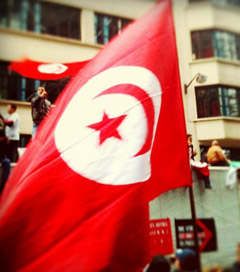Tunis, Tunisia – The two-day battle for a key Libyan border post spilled into Tunisia on Friday as Col. Moammar Gadhafi's forces, riding in at least 15 armed trucks, confronted Tunisian soldiers and fired into civilian areas, wounding two young girls, residents said.
Libyan rebels maintained their hold on Wazin, on the southern border with Tunisia, but the clashes marked a ratcheting up of the conflict between Gadhafi and rebels in the west and raised the specter of cross-border hostilities between Libya and Tunisia.
Tunisian officials summoned the Libyan ambassador in outrage at the incursion — which they said was the third by Gadhafi's forces in 10 days — while Tunisian soldiers detained an unknown number of pro-Gadhafi fighters and disarmed them before allowing them to return to Libyan territory via an unofficial border crossing usually used by smugglers in the air.
A spokesman for the Tunisian military, Rachid Bouhala, told McClatchy that “there is no conflict” between the North African neighbors and that Tunisia wouldn't close its border with Libya. The Tunisian news agency TAP said Tunisian soldiers didn't clash directly with Gadhafi's soldiers and the situation around the border was calm. The injuries to the two Tunisian girls, who were said to be standing in a street in Dehiba where a shell fired by Gadhafi's forces landed, weren't serious.
By Friday afternoon, residents and Tunisian officials said the situation around the border was calm. The injuries to the two Tunisian girls, who were said to be standing in a street in Dehiba where a shell fired by Gadhafi's forces landed, weren't serious.
The Tunisian Defense Ministry said in a statement that its soldiers, who'd taken a mostly hands-off approach to the border hostilities so far, “intervened to stop the advance of some members of Gadhafi's forces, who were gathered up and returned to Libyan territory.”
The Libyan rebels in the sparsely populated Nafusa Mountains, who joined the anti-Gadhafi uprising almost immediately after it began in mid-February, seized Wazin from Gadhafi's forces last week and used it to restock their deserted towns and ferry injured fighters to Tunisian hospitals. The border post sits at a strategic point for Gadhafi, roughly halfway between his capital of Tripoli and the southern desert town of Ghadames, an important supply point for his forces.
The clashes ignited Thursday evening when pro-Gadhafi soldiers overran the rebels and briefly retook the border post. Rebel reinforcements quickly arrived and flushed out the Gadhafi fighters after dark Thursday, but sporadic fighting continued overnight in the dusty hills and valleys around Wazin.
Tens of thousands of Libyans have passed through Wazin to escape to Tunisia in recent days, an exodus that the U.N. refugee agency said had stopped almost completely since the fighting resumed. The U.N. said it was concerned that people fleeing Libya could be caught in the crossfire.
Temporary camps the U.N. erected in southern Tunisia are overflowing with refugees, although the vast majority of Libyans are being sheltered in homes as part of what one Tunisian called “the revolutionary spirit.” The overthrow of Tunisia's longtime dictator in January helped to spark the revolts in Libya and across the Arab world.
If fighting inside Tunisia continues, however, residents' hospitality will be tested.
Islam Ben Hamad, a 34-year-old Tunisian who's living in Dehiba, less than a mile from the border post, said two bullets fired by Gadhafi's forces pierced the outer walls of his home Friday morning. Two Dehiba residents were wounded by the barrage, along with a Libyan living in a refugee camp, he said.
“The people are all scared here,” Ben Hamad said. “There was so much fire inside Dehiba when Gadhafi's army came.”
Radhouane Nouicer, Tunisia's deputy foreign minister, told the satellite news channel Al Jazeera that Tunisia had summoned the Libyan ambassador to Tunis on Friday in “strong protest” of the border incursion.
“We won't tolerate any repetition of such violations,” Nouicer said. “Tunisian soil is a red line, and no one is allowed to breach it.”
© 2011 McClatchy-Tribune Information Services
Truthout has licensed this content. It may not be reproduced by any other source and is not covered by our Creative Commons license.
Media that fights fascism
Truthout is funded almost entirely by readers — that’s why we can speak truth to power and cut against the mainstream narrative. But independent journalists at Truthout face mounting political repression under Trump.
We rely on your support to survive McCarthyist censorship. Please make a tax-deductible one-time or monthly donation.
